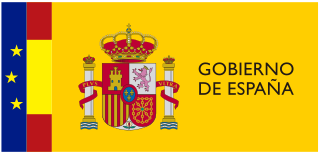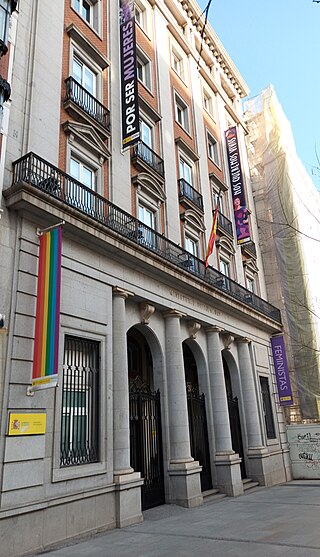
A statutory instrument (SI) is the principal form in which delegated legislation is made in Great Britain.
A decree is a legal proclamation, usually issued by a head of state such as the president of a republic, or a monarch, according to certain procedures. It has the force of law. The particular term used for this concept may vary from country to country. The executive orders made by the President of the United States, for example, are decrees.
Delegated legislation or secondary legislation in the United Kingdom is law that is not enacted by a legislative assembly such as the UK Parliament, but made by a government minister, a delegated person or an authorised body under powers given to them by an Act of Parliament.

The government of Spain is the central government which leads the executive branch and the General State Administration of the Kingdom of Spain.

The Finnish Government is the executive branch and cabinet of Finland, which directs the politics of Finland and is the main source of legislation proposed to the Parliament. The Government has collective ministerial responsibility and represents Finland in the Council of the European Union. In the incumbent Orpo Cabinet, the Government comprises 19 ministers leading 12 ministries.
The King-in-Council or the Queen-in-Council, depending on the sex of the reigning monarch, is a constitutional term in a number of states. In a general sense, it refers to the monarch exercising executive authority, usually in the form of approving orders, on the advice of the country's privy council or executive council.
The Department of Housing, Local Government and Heritage is a department of the Government of Ireland. It is led by the Minister for Housing, Local Government and Heritage.
The Department of Agriculture, Food and the Marine is a department of the Government of Ireland. According to the department, its mission is to "lead the sustainable development of a competitive, consumer focused agri-food sector and to contribute to a vibrant rural economy and society". It is led by the Minister for Agriculture, Food and the Marine.

In Belgium, a Royal Decree (RD) or Royal Order (Dutch), Arrêté Royal (French), or Königlicher Erlass (German) is a federal governmental decree exercising legislation, or powers the legislature has delegated to the King as secondary legislation.

A Scottish statutory instrument is subordinate legislation made by the Scottish Ministers, as well as subordinate legislation made by public bodies using powers provided to be exercisable by Scottish statutory instrument. SSIs are the main form of subordinate legislation in Scotland, being used by default to exercise powers delegated to the Scottish Ministers, the Lord Advocate, the High Court of Justiciary, the Court of Session, and the Queen-in-Council.
In many countries, a statutory instrument is a form of delegated legislation.

The statutory rules of Northern Ireland are the principal form in which delegated legislation is made in Northern Ireland.

The Meritorious service medal for personnel of the Belgian Defence Forces and Foreign Armed Forces is a military decoration of Belgium. It was established on 23 February 2005 as a more rewarding successor of an earlier Medal of Military Merit and is awarded to members of the Belgian Armed Forces and civilians working for the Belgian Defence who show an exemplary meritorious behaviour in the completion of their duties or who have accomplished an exemplary meritorious act.

The Ministry of Economic Affairs and Digital Transformation (MINECO) is the department of the Government of Spain responsible for the proposing and carrying out the government policy on economic affairs, business support and reforms to improve economic potential growth as well as acting as the communication channel with the European Union and other economic and financial international organizations in this matters. Likewise, this department is responsible for the telecommunications policy and the digital transformation.

The Constitutional Reform and Governance Act 2010, or CRAG Act, is an Act of the Parliament of the United Kingdom on UK constitutional law which affected the civil service and the ratification of treaties, and made other significant changes. It extends to all parts of the United Kingdom.

The Ministry of Equality is a department of the Government of Spain responsible for the proposal and execution of the government's policy on equality, with a focus on making the equality between men and women real and effective as well as prevention and eradication of different forms of violence against women. The department's roles also include eradication of all kind of discrimination by sex, racial and ethnic origin, religion or ideology, sexual orientation, gender identity, age, disability or any other personal or social condition or circumstances. It existed from 2008 to 2010 when it merged with the Ministry of Health, and then from 2020.
Primary legislation and secondary legislation are two forms of law, created respectively by the legislative and executive branches of governments in representative democracies. Primary legislation generally consists of statutes, also known as 'acts', that set out broad principles and rules, but may delegate specific authority to an executive branch to make more specific laws under the aegis of the principal act. The executive branch can then issue secondary legislation, creating legally enforceable regulations and the procedures for implementing them.

The Ministry of Science and Innovation (MICINN) is the department of the Government of Spain responsible for developing and implementing the government policy on scientific research, technological development and innovation in all sectors. In particular, MICINN is responsible for the exercise of research, technological development and innovation competencies in space matters, including representation and participation in European Union and International organizations.

The Spanish government departments, commonly known as Ministries, are the main bodies through which the Government of Spain exercise its executive authority. They are also the top level of the General State Administration. The ministerial departments and their organization are created by Royal Decree signed by the Monarch and the Prime Minister and all of them are headed by a Cabinet member called Minister.

The Ministry of Social Affairs (MAS), since 2020 known as Ministry of Social Rights and 2030 Agenda, is a department of the Government of Spain responsible for the government policies on social services, family, minors protection, disability and prevention of youth crime, adoptions and foster care and the promotion of cultural communication and youth association. Likewise, the department is responsible for the government policies on animal welfare and UN Sustainable Development Goals.











